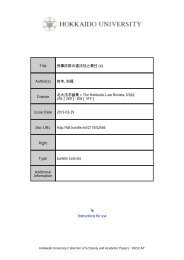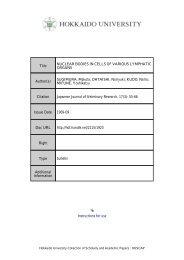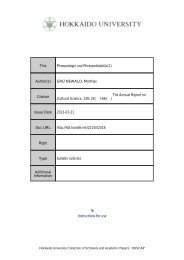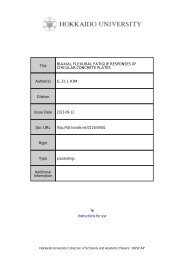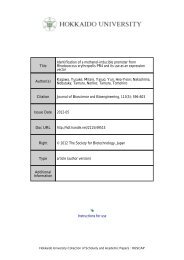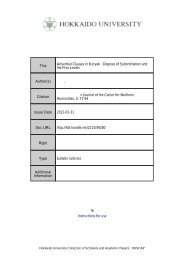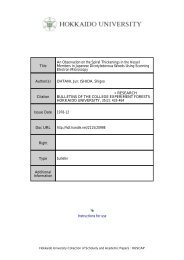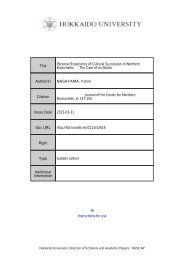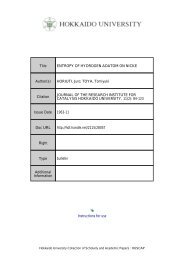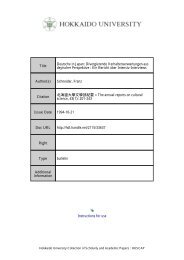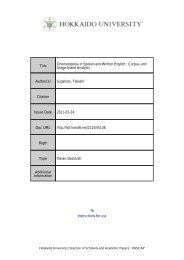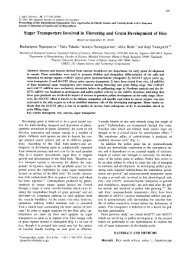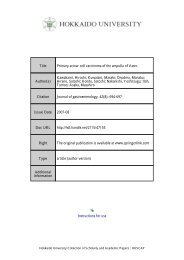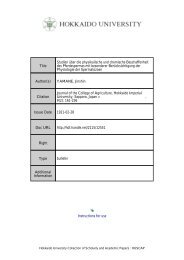The Principle of Subsidiarity: From Johannes Althusius to Jacques ...
The Principle of Subsidiarity: From Johannes Althusius to Jacques ...
The Principle of Subsidiarity: From Johannes Althusius to Jacques ...
Create successful ePaper yourself
Turn your PDF publications into a flip-book with our unique Google optimized e-Paper software.
(Article)<br />
THE PRINCIPLE OF SUBSIDIARITY:<br />
FROM JOHANNES ALTHUSIUS TO JACQUES DELORS*<br />
INTRODUCTION<br />
T ABLE OF CONTENTS<br />
1 <strong>Subsidiarity</strong>: Why So Important?<br />
2 Method and Scope<br />
3 Structure<br />
Ken EN DO<br />
CHAPTER<br />
I . FRAMES OF REFERENCE<br />
1·1 Negative and Positive <strong>Subsidiarity</strong><br />
1·2 Terri<strong>to</strong>rial and Non·Terri<strong>to</strong>rial <strong>Subsidiarity</strong><br />
1·3 Criteria<br />
II. ORIGIN AND IDEAS<br />
II·1 <strong>The</strong> Origin <strong>of</strong> <strong>Subsidiarity</strong><br />
II·2 A Hierarchical View <strong>of</strong> Society<br />
II·3 A Conviction <strong>of</strong> Human Dignity<br />
II·4 <strong>The</strong> Acquisition <strong>of</strong> Terri<strong>to</strong>riality<br />
ill. EVOLUTION IN THE EUROPEAN COMMUNITY<br />
ill·1 Dahrendorf's Criticism <strong>of</strong> the Commission (1971)<br />
ill·2 Spinelli Initiative Part I (1975)<br />
ill·3 Spinelli Initiative Part II (1981·1984)<br />
ill·4 Delors Initiative (1988·1992)
Article<br />
the true principles <strong>of</strong> a sane corporative system which respects the<br />
proper hierarchic structure <strong>of</strong> society; and how the occupational groups<br />
should be fused in<strong>to</strong> a harmonious unity inspired by the principle <strong>of</strong><br />
common good. 42<br />
Thus Pope Pius XI who formulated the principle <strong>of</strong> subsidiarity - was<br />
clearly pointing <strong>to</strong> a hierarchy organised in a corporatist way.<br />
* * *<br />
What was the position <strong>of</strong> the State in relation <strong>to</strong> the hierarchy? For<br />
Catholics, the State was certainly the strongest amongst all the<br />
organisations. However, it was not without constraints. <strong>The</strong> Church taught<br />
that every political power came from almighty God, and therefore that the<br />
State also had <strong>to</strong> be under the guidance <strong>of</strong> natural and divine law. 43 To<br />
borrow Leo XIII's phrase, "the state is bound by the very law <strong>of</strong> its <strong>of</strong>fice <strong>to</strong><br />
serve the common interest.,,44 Or, take another example from John XXIII's<br />
encyclical; "As for the State, its whole raison d 'e1re is the realisation <strong>of</strong> the<br />
common good in the temporal order.,,45 This is <strong>to</strong> say, the State is a means <strong>to</strong><br />
achieve the common good in this world, and it itself has <strong>to</strong> obey the principle<br />
<strong>of</strong> the common good. In this sense, we can say, the Church expected the State<br />
<strong>to</strong> be properly positioned within the hierarchy under the supreme authority<br />
<strong>of</strong> God.<br />
It is against this background that Pius Xl's scepticism <strong>to</strong>wards the<br />
Fascist regime should be unders<strong>to</strong>od. It is because, in the Totalitarian<br />
regime, the State or the Fascist party tried <strong>to</strong> control every piece <strong>of</strong> civil<br />
society, and thus, went far beyond its proper position in the hierarchy.<br />
42. Pius Xl's Encyclical, "Divini Redemp<strong>to</strong>ris, March 19, 1937," quoted in<br />
Terence McLaughlin, ed., <strong>The</strong> Church and the Reconstructian <strong>of</strong> the Modem World:<br />
<strong>The</strong> Social Encyclicals <strong>of</strong> Pope Pius XI (NY; Doubleday & Co., 1957), p. 378.<br />
43. Thomas J. Harte, "General <strong>The</strong>ory <strong>of</strong> the State," in his Papal Social <strong>Principle</strong>: A<br />
Guide and Digest (Gloucester, Mass. ; Peter Smith, 1960), chap. 7, at p. 97. See<br />
also Pius' words, quoted in Camp, op. cit., pp. 146-147.<br />
44. Quoted in Rev. John F. Cronin, Catholic Social <strong>Principle</strong>s; <strong>The</strong> Social Teaching<br />
<strong>of</strong> the Catholic Church Applied <strong>to</strong> American Economic Life 3rd Print (Milwaukee;<br />
<strong>The</strong> Bruce Publishing Company, 1952), p. 95.<br />
45. Pope John XXIII, "Mater et Magistra, Encyclical <strong>of</strong> Pope John XXIII on<br />
Christianity and Social Progress, May 15, 1961." in <strong>The</strong> Papal Encyclicals 1958·<br />
1981 (Raleigh; McGrath Publishing Company, 1981), para. 20.
<strong>The</strong> <strong>Principle</strong> <strong>of</strong> <strong>Subsidiarity</strong><br />
out <strong>to</strong> be one <strong>of</strong> his most vociferous critics. 3 <strong>The</strong> European Parliament also<br />
picked up the issue and a few <strong>of</strong> its members threatened <strong>to</strong> table a vote <strong>of</strong><br />
censure. 4 Franco Malfatti, the ineffectual Commission President who was<br />
negatively referred <strong>to</strong> by name in the articles expressed his regret that ''!'un<br />
de ses membres ait emit une opinion manifestement contraire a celie du<br />
College.,,5 Yet, inside the Commission, Vice· President Sicco Mansholt who<br />
was soon <strong>to</strong> become the President after Malfatti's departure for national<br />
politics helped Dahrendorf, and the procedure that allows the Parliament<br />
only <strong>to</strong> pass a vote <strong>of</strong> censure on the entire Commission, not a single<br />
Commissioner, saved him from a forced resignation. 6<br />
As far as the content and background <strong>of</strong> these articles are concerned,<br />
Dahrendorf strongly argued against the increasing bureaucratisation <strong>of</strong> the<br />
Commission. Though a convinced European, his liberal convictions meant he<br />
felt he had <strong>to</strong> stand up against the widening gap between the supranational<br />
rhe<strong>to</strong>ric <strong>of</strong> Europe and the worsening reality <strong>of</strong> the Community's politics? A<br />
single biggest fac<strong>to</strong>r that led him <strong>to</strong> become a proponent <strong>of</strong> the subsidiarity<br />
principle, according <strong>to</strong> him,8 was the Common Agricultural Policy (CAP). In<br />
reality, unimportant <strong>to</strong>pics such as size <strong>of</strong> beef or label <strong>of</strong> cheese were the<br />
central subject but in Euro-rhe<strong>to</strong>ric, the CAP was expected <strong>to</strong> be a launching<br />
pad for the European Monetary Union at that time. Dahrendorf used<br />
subsidiarity in the following way;<br />
Not everything in Europe is lovely because it happens <strong>to</strong> be European. A<br />
3. Altiero Spinelli referred <strong>to</strong> Dahrendorfs articles as "the naive complacency<br />
expressed by certain newspapers over this happy beginning <strong>of</strong> a second Europe."<br />
See his <strong>The</strong> EuroPean Adventure: tasks foo the Enlarged Community (London:<br />
Charles Knight & Co. Ltd., 1972), p. 35. Cf. a quotation from the Dahrendorfs<br />
article below.<br />
4. One <strong>of</strong> the MEPs, Mr. Bos (Christian Democrats, <strong>The</strong> Netherlands), for instance,<br />
expressed strong doubts as <strong>to</strong> Dahrendorfs quality as EC Commissioner. See<br />
"Question orale n° 10171 avec debat: articles de dans<br />
l'hebdomadaire ," Journal <strong>of</strong>ficiel des Communautes europeennes W 141,<br />
septembre 1971, pp. 76-85, at 79.<br />
5. Ibid., at p. 80; see also Bull. EC, Vol. 4, No. 11-1971, pp. 95-96.<br />
6. Author's interview with Lord Dahrendorf, Oxford, 19 January 1994.<br />
7. His "Wieland Europa," op. cit., p. 3.<br />
8. Interview with Lord Dahrendorf, Oxford, 19 January 1994.
Article<br />
Commission Report. 15<br />
With regard <strong>to</strong> the content <strong>of</strong> the Commission Report, we can easily<br />
find Spinelli's ideas. For instance, a distinction was made between the<br />
exclusive, concurrent and potential competences <strong>of</strong> the European Union,<br />
which was typically federalistic as was illustrated in the Grundgesetz and as<br />
would be incorporated in<strong>to</strong> the Draft Treaty establishing European Union<br />
adopted by the European Parliament later in 1984.<br />
More significantly, this report explicitly and for the first time used<br />
the principle <strong>of</strong> subsidiarity (,principe de subsidiariti ') in a <strong>of</strong>ficial document<br />
<strong>of</strong> the European Community. Article 12 <strong>of</strong> the report states;<br />
No more than the existing Communities have done so, European Union is<br />
not <strong>to</strong> give birth <strong>to</strong> a centralizing super-state. Consequently, and in<br />
accordance with the principe de subsidiarite, the Union will be given<br />
responsibility only for those matters which the Member States are no<br />
longer capable <strong>of</strong> dealing with efficiently. If the Union is <strong>to</strong> be given<br />
competence in areas not specified in the Act <strong>of</strong> Constitution, the Act will<br />
have <strong>to</strong> be amended by a procedure probably entailing ratification by all<br />
the Member States.<br />
Hence, the competence <strong>of</strong> the Union will be limited <strong>to</strong> what is assigned <strong>to</strong><br />
it, meaning that its fields <strong>of</strong> competence will be specified in the Act <strong>of</strong><br />
Constitution, other matter being left <strong>to</strong> the Member States. <strong>The</strong>re is<br />
nothing new in this. As in the existing Communities, the Union could be<br />
given competence <strong>of</strong> three types: exclusive, concurrent and potential, as<br />
explained below. <strong>The</strong> term on which competence may be exercised may<br />
vary from type <strong>to</strong> type.<br />
Of course, in deciding on the Union's competence, application <strong>of</strong> the<br />
principe de subsidiarite is restricted by the fact that the Union must be<br />
15. Author's interview with Mr. Pier Virgilio Das<strong>to</strong>li, Brussels, 26 March 1992.<br />
Mr. Perissich remarked in retrospect that, it was probably SpineJli who initially<br />
had the idea <strong>of</strong> inserting the principle <strong>of</strong> subsidiarity in<strong>to</strong> the Commission<br />
report. Mrs. Spinelli, keen German federalist, helped her husband become<br />
familiar with German federalism. Interview with Mr. Riccardo Perissich,<br />
Brussels, 23 August 1993. It may be noted, however, that Mrs. Spinell was a<br />
jewish German, not a Catholic. Interview with Lord Dahrendorf, Oxford, 19<br />
January 1994.



